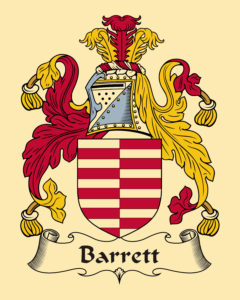
We sell our products exclusively on Amazon so you can buy with confidence knowing you are protected by Amazons no hassle return policy and our 4.9 star lifetime seller rating with over 2000 reviews. Items featuring a family crest make great gifts, whether for yourself or that hard to buy for family member, friend or co-worker.
We sell Mugs, Plaques, Prints, Ceramic Tiles, Coasters, Garden Flags, License Plates and Mouse Pads featuring The Barrett Coat of Arms. Click the image to go to Anglo/Irish names A section of our Amazon store.
We also sell customized license plates (add your own image and text). customizable mugs and license plates for military veterans, classic art on mouse pads and posters, a wide variety of flag license plates for nations around the world as well as pride flags and Native American tribal flags. Click here to go to our Amazon Store front.
Etymology
The surname Barrett is an Anglo-Irish-Scottish name with deep historical roots that stretch across England, Ireland, and Scotland, and it has become prominent in the United States. The name Barrett has evolved over centuries, adapting to different linguistic and cultural influences, which has resulted in various spelling variations.
Origin and Meaning
The surname Barrett is of Norman origin, introduced into the British Isles after the Norman Conquest of 1066. The name is believed to derive from the Old French word “barat,” which means “deceit” or “fraud,” possibly referring to a person who was considered crafty or shrewd in dealings. Another theory suggests that the name could come from the Old Germanic personal name “Beroald,” composed of the elements “bera” (bear) and “wald” (rule), meaning “bear power” or “bear ruler.” This dual possibility highlights the surname’s complex etymology, reflecting the blending of linguistic traditions in medieval Europe.
Earliest Recorded Use in England
In England, the Barrett surname first appears in the 11th and 12th centuries, shortly after the Norman Conquest. One of the earliest recorded uses of the surname is found in the Domesday Book of 1086, where a certain Roger Barrett is mentioned as a landholder in Essex. The Domesday Book was a comprehensive survey of England commissioned by William the Conqueror, and the presence of the Barrett name in this document indicates the family’s early prominence.
Over the centuries, the Barrett family became established in various parts of England, particularly in the counties of Devon, Somerset, and Essex. The family’s influence grew, and they became landowners and members of the gentry.
Presence in Scotland
In Scotland, the Barrett surname also has a long history, though it is less widespread than in England or Ireland. The name was likely introduced to Scotland by Norman settlers in the 12th and 13th centuries. In Scotland, Barretts were found primarily in the Lowlands, particularly in areas like Ayrshire and Lanarkshire. The name may have also arrived in Scotland through English and Irish migrations, particularly during periods of political upheaval and economic hardship.
The Scottish Barretts were typically involved in agriculture and trade, with some families rising to prominence as local leaders and landowners.
Arrival in Ireland
The Barrett surname has a particularly strong association with Ireland, where it became deeply rooted. The Barretts were part of the Norman invasion of Ireland in the late 12th century, led by Richard de Clare, also known as Strongbow. The Barrett family settled in two main areas: the province of Munster, particularly in County Cork, and the province of Connacht, particularly in County Mayo.
In County Mayo, the Barretts became known as a prominent Gaelicized Norman family, adopting many Irish customs and even the Irish language. The family became known as “Baireid” in Irish, and they held significant power and land, particularly around the barony of Tirawley. In Munster, the Barretts also established themselves as influential landowners, and their descendants continue to reside in the region to this day.
Emigration to the United States
The Barrett name made its way to the United States during the waves of Irish and Scottish immigration in the 18th and 19th centuries. Many Barretts fled Ireland during the Great Famine (1845-1852), seeking a better life in America. They settled in various parts of the United States, particularly in cities like Boston, New York, and Chicago, where Irish and Scottish communities were strong.
In the United States, the Barretts have contributed to various fields, including politics, business, and the arts. The name has continued to evolve and adapt to the diverse cultural landscape of America, though it retains its strong connections to its Anglo-Irish-Scottish roots.
Spelling Variations
Due to the surname’s long history and widespread geographical distribution, numerous spelling variations of Barrett have emerged. These variations often resulted from linguistic differences, regional dialects, and the phonetic spelling practices of the time. Some of the most common spelling variations include:
Barret, Barratt, Barritt, Baret, Barette, Barrott, Barre, Barry
Each of these variations reflects the diverse influences that have shaped the Barrett surname over centuries, from Old French and Norman roots to Gaelic and English adaptations.
Conclusion
The surname Barrett is a fascinating example of how names evolve over time, influenced by historical events, migrations, and cultural exchanges. From its Norman origins to its establishment in England, Scotland, and Ireland, and its eventual spread to the United States, the Barrett name carries with it a rich tapestry of history. The many spelling variations of the name further illustrate the complex journey of this surname across different regions and eras. Today, the Barrett name remains a symbol of resilience and adaptability, embodying the diverse heritage of those who bear it.